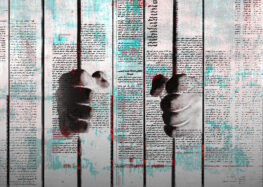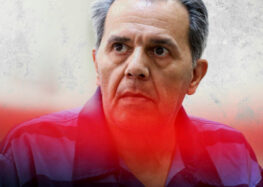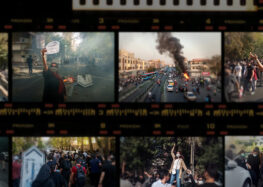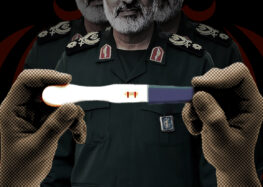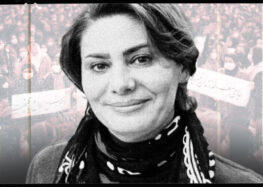“AIDS Danger at Prison Infirmary” Says Zeidabadi’s Wife
Prominent Iranian journalist Ahmad Zeidabadi has been in prison since the Iranian elections. His wife, Mahdieh Mohammadi, told the International Campaign for Human Rights in Iran that she is concerned about her husband’s health. Mr. Zeidabadi is serving time under very difficult conditions among dangerous common criminals at Rajaee Shahr Prison in Karaj, which lacks prisoner classification; plus Mr. Zeidabadi remains imprisoned despite the fact that his $500,000 bail has been posted, and the bail amount is also in custody of the Judiciary, Ms. Mohammadi said.
She said she and her three children have to spend hours to visit Mr. Zeidabadi through a booth for 15 minutes. “Mr. Zeidabadi is spending his exile at Rajaee Shahr Prison. He is kept with common criminals who have committed serious crimes such as murder and smuggling–and none of the political prisoners are near him. He has been sentenced to six years’ imprisonment, five years’ exile, and lifetime deprivation of social and political activities. “Our visits are very difficult. I can only go to see him every other week. Counting the commute time, it takes about five hours each time, since the prison is 40 kilometers away–and once there, we have to wait a very long time for our 15 minute meeting. Our children can only go to visit their father once every three or four months.”
Referring to Ahmad Zeidabadi’s unsuitable conditions under interrogations and during his detention over the past year Ms. Mohammadi said: “There are many cases of violations in his case. From the very first day when he was abducted from our home at 10:00 pm, to 141 days in solitary confinement, beatings, through illegal interrogations–his rights have been violated numerous times. During very difficult interrogations, he was given a sheet of paper and ordered to write down his own charges, whereas he should have been informed of his charges. They gave him the sheet of paper and beat him violently and told him to write down all his moral and financial crimes. They tried to force all those charges on him, but he didn’t accept them. He told them that he is a journalist and his records are clear. They pulled the sheet of paper away and fired a shot inside his cell. He told me that he felt like his face was numb. He was transferred to Ward 350 after 141 days, and for a very short time there were other political prisoners there with him. But he was moved to Rajaee Shahr Prison on 1 February 2010.”
Mahdieh Mohammadi emphasized the injustice in her husband’s case. She said that the indictment, upon which her husband’s heavy sentence was issued, referred to Zeidabadi’s acting legally in his activities–saying that, “’He intended to deceive through observing the law!’ My husband’s treatment by the Judiciary only shows that those who are are supported by the authorities can trample the law completely–much like Mr. Mortazavi, who is accused of so many illegal activities, even murder. But he is free to live comfortably.”
Mahdieh Mohammadi referred to the unhygienic and sub-standard conditions that Mr. Zeidabadi and other prisoners’ in detention at Rajaee Shahr Prison are forced to bear. “The hygienic conditions of the prison are not good. For a long time, the prison’s water was muddy and unusable. With the water condition, he couldn’t take showers, either. It appears that the hall where he resides is a long corridor with rooms which were formerly solitary cells on both sides. The doors to the cells have been removed and now three people reside in each cell. The prison food is not good, and the prison store does not have sufficient food supplies. There is serious concern about diseases such as AIDS in the prison infirmary, too. I tell him not to go to the infirmary to the extent possible, because most of the addict prisoners have AIDS. I fear that he might contract the disease if he goes to the infirmary.”
Ahmad Zeidabadi is regularly witnessing entanglements and fights among prisoners who are convicted murderers, smugglers, and addicts–and according to him, he has witnessed the murder of one of the prisoners in a group fight. Expressing concern about her husband’s lack of security among unclassified prisoners, Mahdieh Mohammadi told the Campaign: “There are dangerous prisoners in this ward. For example they once stole a portable soccer goal net and made knives out of its metal frame. The prisoners pull knives on each other at the slightest disagreement. He has witnessed them injuring each other with knives, and once someone was killed in the scuffle. In this ward, many addict prisoners frequently get into fights over money. The fact that this prison has horrible conditions and that no human rights principles are observed in it is bad enough. But Mr. Zeidabadi does not belong to this prison. Even based on prisoner classification requirements, as a journalist, he should not be kept under such conditions.”
According to Ahmad Zeidabadi’s wife, the judge at Branch 26 of the Revolutionary Courts refuses to release him on bail or even on a short furlough, despite the fact that the bail amount which has been increased several times has been posted.
News Background:
On 2 January 2009, Ahmad Zeidabadi, a prominent journalist was sentenced to six years in prison, five years in exile in Gonabad, and lifetime deprivation of social and political activities. His charge was “attempt to implement a velvet revolution,” the most significant evidence of which was an open letter Zeidabadi had written the Iranian president, criticizing him. An appeals court upheld the lower court’s ruling. Though Zeidabadi’s bail has been posted in full, he has not be released on bail and he has been unable to go on any furlough leave for almost a year.

